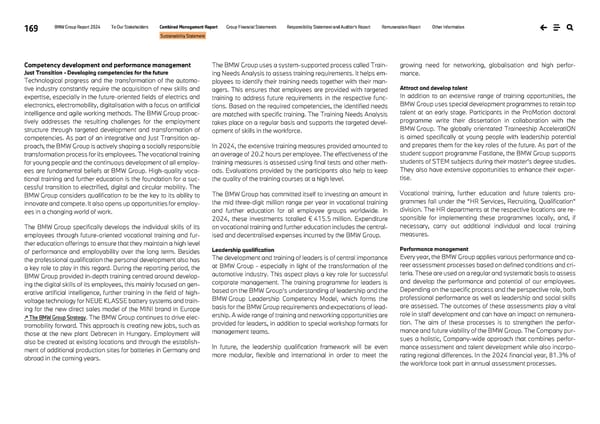169 BMW Group Report 2024 To Our Stakeholders Combined Management Report Group Financial Statements Responsibility Statement and Auditor’s Report Remuneration Report Other Information Sustainability Statement Competency development and performance management Just Transition - Developing competencies for the future Technological progress and the transformation of the automo- tive industry constantly require the acquisition of new skills and expertise, especially in the future-oriented fields of electrics and electronics, electromobility, digitalisation with a focus on artificial intelligence and agile working methods. The BMW Group proac- tively addresses the resulting challenges for the employment structure through targeted development and transformation of competencies. As part of an integrative and Just Transition ap- proach, the BMW Group is actively shaping a socially responsible transformation process for its employees. The vocational training for young people and the continuous development of all employ- ees are fundamental beliefs at BMW Group. High-quality voca- tional training and further education is the foundation for a suc- cessful transition to electrified, digital and circular mobility. The BMW Group considers qualification to be the key to its ability to innovate and compete. It also opens up opportunities for employ- ees in a changing world of work. The BMW Group specifically develops the individual skills of its employees through future-oriented vocational training and fur- ther education offerings to ensure that they maintain a high level of performance and employability over the long term. Besides the professional qualification the personal development also has a key role to play in this regard. During the reporting period, the BMW Group provided in-depth training centred around develop- ing the digital skills of its employees, this mainly focused on gen- erative artificial intelligence, further training in the field of high- voltage technology for NEUE KLASSE battery systems and train- ing for the new direct sales model of the MINI brand in Europe ↗ The BMW Group Strategy. The BMW Group continues to drive elec- tromobility forward. This approach is creating new jobs, such as those at the new plant Debrecen in Hungary. Employment will also be created at existing locations and through the establish- ment of additional production sites for batteries in Germany and abroad in the coming years. The BMW Group uses a system-supported process called Train- ing Needs Analysis to assess training requirements. It helps em- ployees to identify their training needs together with their man- agers. This ensures that employees are provided with targeted training to address future requirements in the respective func- tions. Based on the required competencies, the identified needs are matched with specific training. The Training Needs Analysis takes place on a regular basis and supports the targeted devel- opment of skills in the workforce. In 2024, the extensive training measures provided amounted to an average of 20.2 hours per employee. The effectiveness of the training measures is assessed using final tests and other meth- ods. Evaluations provided by the participants also help to keep the quality of the training courses at a high level. The BMW Group has committed itself to investing an amount in the mid three-digit million range per year in vocational training and further education for all employee groups worldwide. In 2024, these investments totalled € 415.5 million. Expenditure on vocational training and further education includes the central- ised and decentralised expenses incurred by the BMW Group. Leadership qualification The development and training of leaders is of central importance at BMW Group - especially in light of the transformation of the automotive industry. This aspect plays a key role for successful corporate management. The training programme for leaders is based on the BMW Group’s understanding of leadership and the BMW Group Leadership Competency Model, which forms the basis for the BMW Group requirements and expectations of lead- ership. A wide range of training and networking opportunities are provided for leaders, in addition to special workshop formats for management teams. In future, the leadership qualification framework will be even more modular, flexible and international in order to meet the growing need for networking, globalisation and high perfor- mance. Attract and develop talent In addition to an extensive range of training opportunities, the BMW Group uses special development programmes to retain top talent at an early stage. Participants in the ProMotion doctoral programme write their dissertation in collaboration with the BMW Group. The globally orientated Traineeship AcceleratiON is aimed specifically at young people with leadership potential and prepares them for the key roles of the future. As part of the student support programme Fastlane, the BMW Group supports students of STEM subjects during their master’s degree studies. They also have extensive opportunities to enhance their exper- tise. Vocational training, further education and future talents pro- grammes fall under the “HR Services, Recruiting, Qualification” division. The HR departments at the respective locations are re- sponsible for implementing these programmes locally, and, if necessary, carry out additional individual and local training measures. Performance management Every year, the BMW Group applies various performance and ca- reer assessment processes based on defined conditions and cri- teria. These are used on a regular and systematic basis to assess and develop the performance and potential of our employees. Depending on the specific process and the perspective role, both professional performance as well as leadership and social skills are assessed. The outcomes of these assessments play a vital role in staff development and can have an impact on remunera- tion. The aim of these processes is to strengthen the perfor- mance and future viability of the BMW Group. The Company pur- sues a holistic, Company-wide approach that combines perfor- mance assessment and talent development while also incorpo- rating regional differences. In the 2024 financial year, 81.3% of the workforce took part in annual assessment processes.
 BMW Group Report 2024 Page 168 Page 170
BMW Group Report 2024 Page 168 Page 170